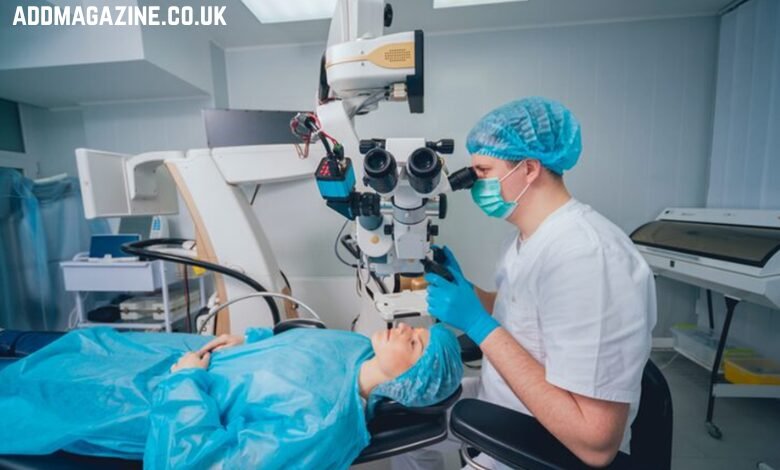When it comes to vision correction, patients often wonder whether they should visit a general eye specialist or a LASIK surgeon. While both are professionals in the field of eye health, their training, expertise, and focus can vary significantly. Understanding these differences can help patients make informed choices when considering advanced treatments such as laser eye surgery in Norwich.
The Role of General Eye Specialists
General eye specialists, also known as ophthalmologists or optometrists depending on their qualifications, play a critical role in maintaining eye health. They conduct eye examinations, prescribe corrective lenses, diagnose common conditions such as cataracts, glaucoma, or dry eye, and manage treatments for many eye-related problems. Optometrists are primarily focused on routine vision care and may refer patients to a specialist for surgical options. Ophthalmologists, on the other hand, are medical doctors who can treat a wider range of conditions, perform minor procedures, and provide long-term management of eye diseases. However, when it comes to complex surgical procedures like LASIK, patients often need to see a dedicated LASIK surgeon.
What Sets a LASIK Surgeon Apart
A LASIK surgeon is an ophthalmologist who has undergone additional training in refractive surgery. This training equips them with specialised knowledge in correcting vision issues such as myopia, hyperopia, and astigmatism through laser technology. Unlike general eye specialists who focus on overall eye health, a LASIK surgeon’s expertise lies in evaluating whether a patient is suitable for surgery, performing the procedure with precision, and managing aftercare to ensure the best possible outcome. Their experience in handling high-tech laser equipment, assessing corneal thickness, and understanding subtle variations in eye anatomy gives them an advanced skill set that general practitioners may not possess. When consulting a qualified specialist, patients also gain clear guidance on laser eye surgery cost, with transparent pricing that reflects the technology used, the surgeon’s expertise, and the level of personalised care provided.
Training and Experience Differences

General eye specialists receive broad medical training that covers a wide spectrum of eye conditions. LASIK surgeons, however, build on this foundation by gaining advanced training in refractive surgery techniques. They spend years mastering the use of laser systems, refining surgical techniques, and keeping up with technological advancements. This level of specialisation is what allows them to perform laser eye surgery in Norwich with a high degree of precision and safety. In addition, LASIK surgeons typically handle a larger number of surgical cases compared to general eye specialists, giving them more hands-on experience in addressing vision correction through surgical methods.
Patient Assessment and Suitability
One of the most important distinctions between general eye specialists and LASIK surgeons is how they assess patient suitability for procedures. A general specialist may identify a patient’s refractive error and recommend corrective glasses or contact lenses. If the patient expresses interest in surgery, they will likely be referred to a LASIK surgeon. The LASIK surgeon then performs a detailed assessment, including measuring corneal thickness, evaluating pupil size, and checking for underlying conditions such as keratoconus. These in-depth assessments are crucial because not every patient is a candidate for LASIK. The specialised evaluation ensures that the procedure is safe and effective for each individual.
Surgical Expertise and Technology
LASIK surgeons are equipped with state-of-the-art laser technology designed specifically for vision correction. Their role requires precise calibration of equipment, steady surgical skill, and the ability to tailor each procedure to the patient’s unique eye characteristics. While general eye specialists may not perform complex surgeries, LASIK surgeons are highly trained in using excimer and femtosecond lasers. Their advanced surgical skills allow them to reshape the cornea with minimal discomfort and faster recovery times, offering long-term vision improvement without dependence on glasses or contacts.
Aftercare and Follow-Up

Aftercare is another area where LASIK surgeons differ from general specialists. While both provide follow-up care, LASIK surgeons are trained to identify and manage post-surgical complications such as dry eye, flap issues, or vision fluctuations. They design customised aftercare plans, schedule regular check-ups, and provide treatments to support healing. Patients undergoing laser eye surgery in Norwich benefit from having a surgeon who understands the unique challenges of post-LASIK recovery and can offer solutions tailored to their needs.
The Benefits of Seeing a LASIK Surgeon
Choosing a LASIK surgeon offers several benefits. Patients gain access to advanced surgical expertise, cutting-edge technology, and tailored aftercare. A LASIK surgeon can provide a long-term solution to refractive errors, improving quality of life by reducing dependence on glasses or contact lenses. Additionally, their focused training ensures they can identify subtle issues that may affect surgical outcomes, giving patients peace of mind throughout the process.
Conclusion
While general eye specialists play an important role in overall vision care, LASIK surgeons bring a specialised skill set that makes them uniquely qualified to perform vision correction procedures. For patients considering laser eye surgery in Norwich, understanding the distinction between these two types of professionals can help in making the right decision. By consulting a LASIK surgeon, patients can be confident they are receiving expert care tailored to their needs, from initial assessment through to post-surgery aftercare.




